MGT600: Reflective Report on Management, People, and Team Dynamics
VerifiedAdded on 2023/06/03
|6
|1271
|361
Report
AI Summary
This reflective report analyzes key management principles, organizational dynamics, and leadership strategies, drawing on concepts from the first three weeks of a Management, People, and Teams module (MGT600). It explores the nature of organizations, the roles of management (planning, organizing, leading, and controlling), and the importance of human resources. The report emphasizes the significance of motivation, power dynamics, communication, conflict resolution, and negotiation in achieving organizational goals. It reflects on the challenges managers face, such as decision-making in uncertain environments and managing conflicts, while highlighting the importance of effective communication channels and understanding employee needs. The author reflects on how these concepts apply to their internship experiences and how they can be used in future management roles. The report concludes by emphasizing the critical role of effective management, employee motivation, and conflict resolution in organizational success.
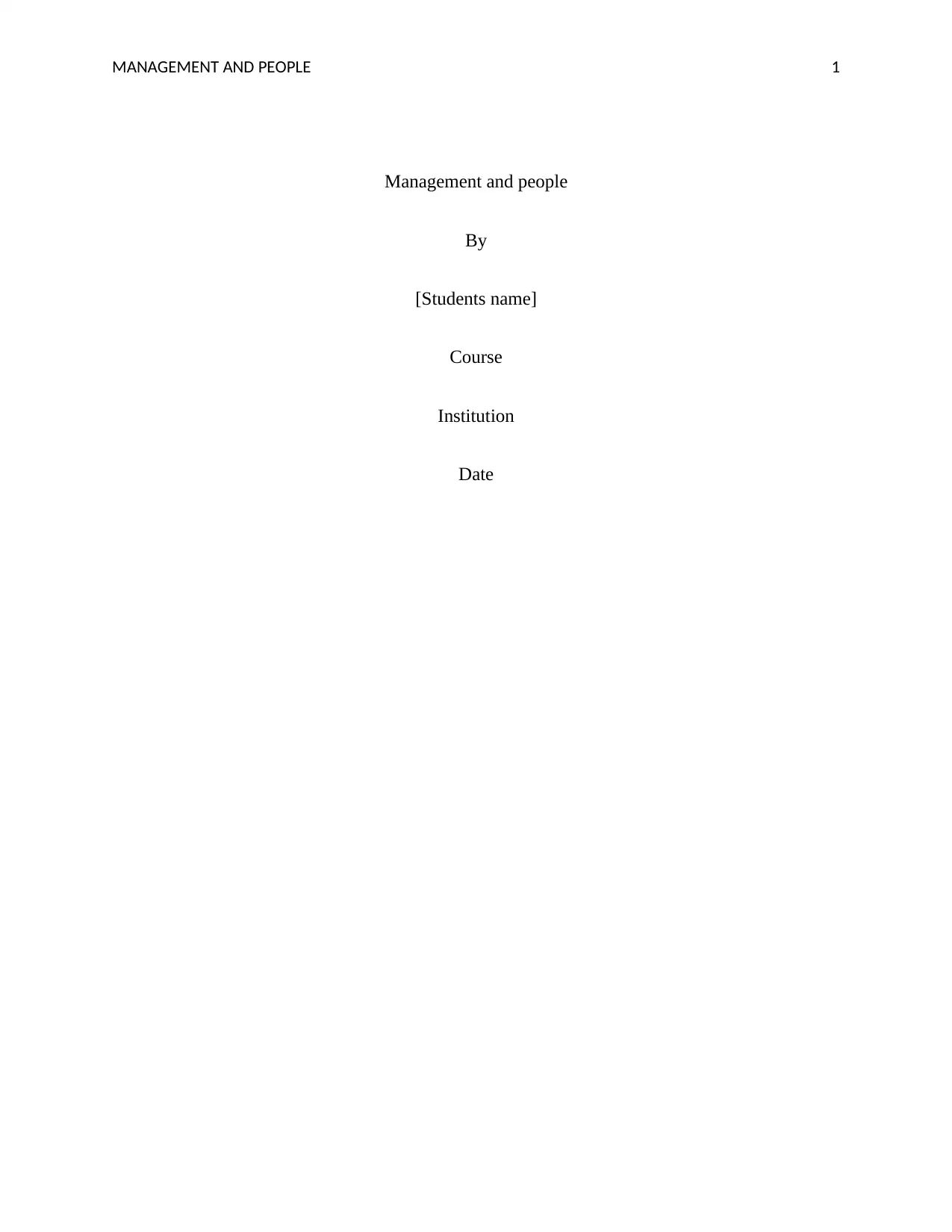
MANAGEMENT AND PEOPLE 1
Management and people
By
[Students name]
Course
Institution
Date
Management and people
By
[Students name]
Course
Institution
Date
Paraphrase This Document
Need a fresh take? Get an instant paraphrase of this document with our AI Paraphraser
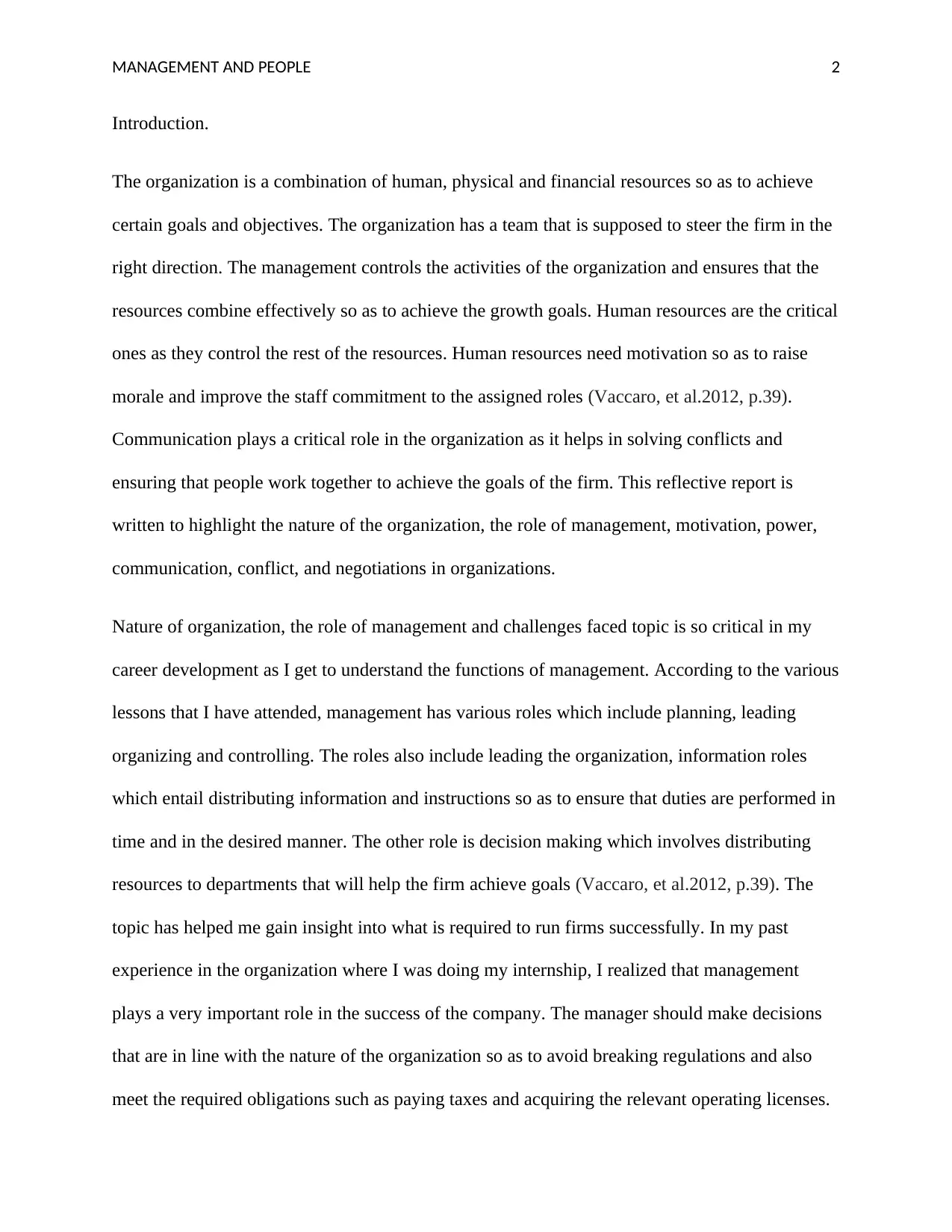
MANAGEMENT AND PEOPLE 2
Introduction.
The organization is a combination of human, physical and financial resources so as to achieve
certain goals and objectives. The organization has a team that is supposed to steer the firm in the
right direction. The management controls the activities of the organization and ensures that the
resources combine effectively so as to achieve the growth goals. Human resources are the critical
ones as they control the rest of the resources. Human resources need motivation so as to raise
morale and improve the staff commitment to the assigned roles (Vaccaro, et al.2012, p.39).
Communication plays a critical role in the organization as it helps in solving conflicts and
ensuring that people work together to achieve the goals of the firm. This reflective report is
written to highlight the nature of the organization, the role of management, motivation, power,
communication, conflict, and negotiations in organizations.
Nature of organization, the role of management and challenges faced topic is so critical in my
career development as I get to understand the functions of management. According to the various
lessons that I have attended, management has various roles which include planning, leading
organizing and controlling. The roles also include leading the organization, information roles
which entail distributing information and instructions so as to ensure that duties are performed in
time and in the desired manner. The other role is decision making which involves distributing
resources to departments that will help the firm achieve goals (Vaccaro, et al.2012, p.39). The
topic has helped me gain insight into what is required to run firms successfully. In my past
experience in the organization where I was doing my internship, I realized that management
plays a very important role in the success of the company. The manager should make decisions
that are in line with the nature of the organization so as to avoid breaking regulations and also
meet the required obligations such as paying taxes and acquiring the relevant operating licenses.
Introduction.
The organization is a combination of human, physical and financial resources so as to achieve
certain goals and objectives. The organization has a team that is supposed to steer the firm in the
right direction. The management controls the activities of the organization and ensures that the
resources combine effectively so as to achieve the growth goals. Human resources are the critical
ones as they control the rest of the resources. Human resources need motivation so as to raise
morale and improve the staff commitment to the assigned roles (Vaccaro, et al.2012, p.39).
Communication plays a critical role in the organization as it helps in solving conflicts and
ensuring that people work together to achieve the goals of the firm. This reflective report is
written to highlight the nature of the organization, the role of management, motivation, power,
communication, conflict, and negotiations in organizations.
Nature of organization, the role of management and challenges faced topic is so critical in my
career development as I get to understand the functions of management. According to the various
lessons that I have attended, management has various roles which include planning, leading
organizing and controlling. The roles also include leading the organization, information roles
which entail distributing information and instructions so as to ensure that duties are performed in
time and in the desired manner. The other role is decision making which involves distributing
resources to departments that will help the firm achieve goals (Vaccaro, et al.2012, p.39). The
topic has helped me gain insight into what is required to run firms successfully. In my past
experience in the organization where I was doing my internship, I realized that management
plays a very important role in the success of the company. The manager should make decisions
that are in line with the nature of the organization so as to avoid breaking regulations and also
meet the required obligations such as paying taxes and acquiring the relevant operating licenses.
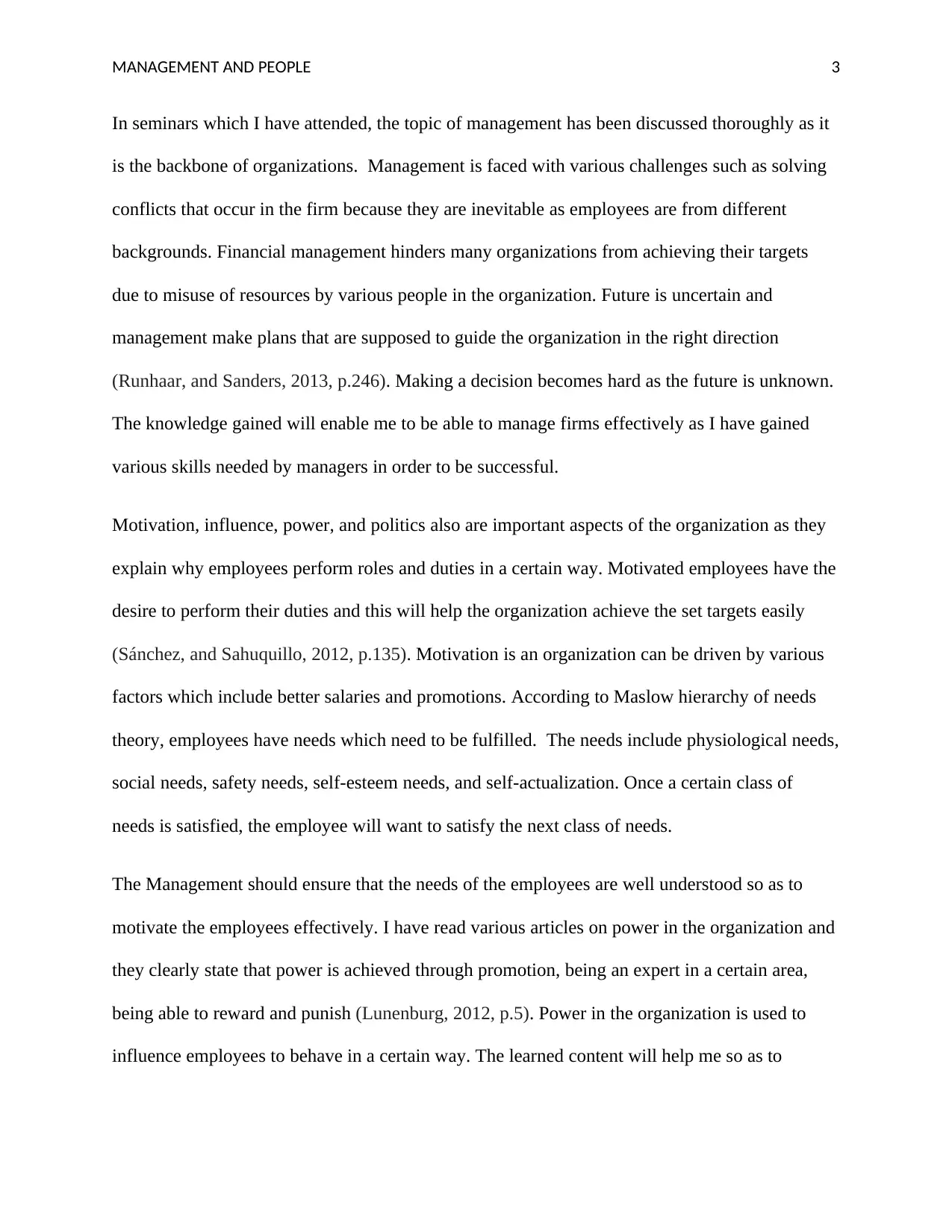
MANAGEMENT AND PEOPLE 3
In seminars which I have attended, the topic of management has been discussed thoroughly as it
is the backbone of organizations. Management is faced with various challenges such as solving
conflicts that occur in the firm because they are inevitable as employees are from different
backgrounds. Financial management hinders many organizations from achieving their targets
due to misuse of resources by various people in the organization. Future is uncertain and
management make plans that are supposed to guide the organization in the right direction
(Runhaar, and Sanders, 2013, p.246). Making a decision becomes hard as the future is unknown.
The knowledge gained will enable me to be able to manage firms effectively as I have gained
various skills needed by managers in order to be successful.
Motivation, influence, power, and politics also are important aspects of the organization as they
explain why employees perform roles and duties in a certain way. Motivated employees have the
desire to perform their duties and this will help the organization achieve the set targets easily
(Sánchez, and Sahuquillo, 2012, p.135). Motivation is an organization can be driven by various
factors which include better salaries and promotions. According to Maslow hierarchy of needs
theory, employees have needs which need to be fulfilled. The needs include physiological needs,
social needs, safety needs, self-esteem needs, and self-actualization. Once a certain class of
needs is satisfied, the employee will want to satisfy the next class of needs.
The Management should ensure that the needs of the employees are well understood so as to
motivate the employees effectively. I have read various articles on power in the organization and
they clearly state that power is achieved through promotion, being an expert in a certain area,
being able to reward and punish (Lunenburg, 2012, p.5). Power in the organization is used to
influence employees to behave in a certain way. The learned content will help me so as to
In seminars which I have attended, the topic of management has been discussed thoroughly as it
is the backbone of organizations. Management is faced with various challenges such as solving
conflicts that occur in the firm because they are inevitable as employees are from different
backgrounds. Financial management hinders many organizations from achieving their targets
due to misuse of resources by various people in the organization. Future is uncertain and
management make plans that are supposed to guide the organization in the right direction
(Runhaar, and Sanders, 2013, p.246). Making a decision becomes hard as the future is unknown.
The knowledge gained will enable me to be able to manage firms effectively as I have gained
various skills needed by managers in order to be successful.
Motivation, influence, power, and politics also are important aspects of the organization as they
explain why employees perform roles and duties in a certain way. Motivated employees have the
desire to perform their duties and this will help the organization achieve the set targets easily
(Sánchez, and Sahuquillo, 2012, p.135). Motivation is an organization can be driven by various
factors which include better salaries and promotions. According to Maslow hierarchy of needs
theory, employees have needs which need to be fulfilled. The needs include physiological needs,
social needs, safety needs, self-esteem needs, and self-actualization. Once a certain class of
needs is satisfied, the employee will want to satisfy the next class of needs.
The Management should ensure that the needs of the employees are well understood so as to
motivate the employees effectively. I have read various articles on power in the organization and
they clearly state that power is achieved through promotion, being an expert in a certain area,
being able to reward and punish (Lunenburg, 2012, p.5). Power in the organization is used to
influence employees to behave in a certain way. The learned content will help me so as to
⊘ This is a preview!⊘
Do you want full access?
Subscribe today to unlock all pages.

Trusted by 1+ million students worldwide
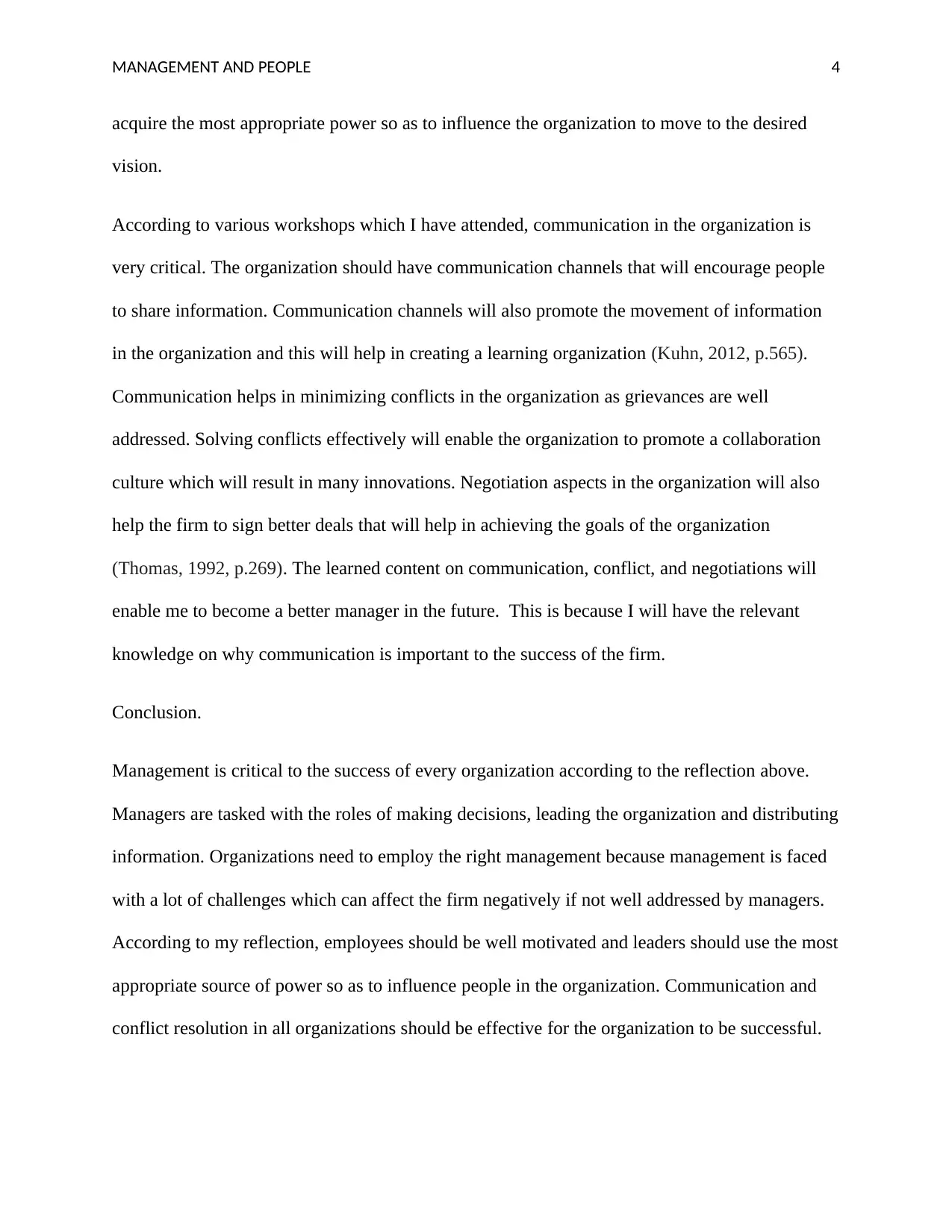
MANAGEMENT AND PEOPLE 4
acquire the most appropriate power so as to influence the organization to move to the desired
vision.
According to various workshops which I have attended, communication in the organization is
very critical. The organization should have communication channels that will encourage people
to share information. Communication channels will also promote the movement of information
in the organization and this will help in creating a learning organization (Kuhn, 2012, p.565).
Communication helps in minimizing conflicts in the organization as grievances are well
addressed. Solving conflicts effectively will enable the organization to promote a collaboration
culture which will result in many innovations. Negotiation aspects in the organization will also
help the firm to sign better deals that will help in achieving the goals of the organization
(Thomas, 1992, p.269). The learned content on communication, conflict, and negotiations will
enable me to become a better manager in the future. This is because I will have the relevant
knowledge on why communication is important to the success of the firm.
Conclusion.
Management is critical to the success of every organization according to the reflection above.
Managers are tasked with the roles of making decisions, leading the organization and distributing
information. Organizations need to employ the right management because management is faced
with a lot of challenges which can affect the firm negatively if not well addressed by managers.
According to my reflection, employees should be well motivated and leaders should use the most
appropriate source of power so as to influence people in the organization. Communication and
conflict resolution in all organizations should be effective for the organization to be successful.
acquire the most appropriate power so as to influence the organization to move to the desired
vision.
According to various workshops which I have attended, communication in the organization is
very critical. The organization should have communication channels that will encourage people
to share information. Communication channels will also promote the movement of information
in the organization and this will help in creating a learning organization (Kuhn, 2012, p.565).
Communication helps in minimizing conflicts in the organization as grievances are well
addressed. Solving conflicts effectively will enable the organization to promote a collaboration
culture which will result in many innovations. Negotiation aspects in the organization will also
help the firm to sign better deals that will help in achieving the goals of the organization
(Thomas, 1992, p.269). The learned content on communication, conflict, and negotiations will
enable me to become a better manager in the future. This is because I will have the relevant
knowledge on why communication is important to the success of the firm.
Conclusion.
Management is critical to the success of every organization according to the reflection above.
Managers are tasked with the roles of making decisions, leading the organization and distributing
information. Organizations need to employ the right management because management is faced
with a lot of challenges which can affect the firm negatively if not well addressed by managers.
According to my reflection, employees should be well motivated and leaders should use the most
appropriate source of power so as to influence people in the organization. Communication and
conflict resolution in all organizations should be effective for the organization to be successful.
Paraphrase This Document
Need a fresh take? Get an instant paraphrase of this document with our AI Paraphraser

MANAGEMENT AND PEOPLE 5
References
References
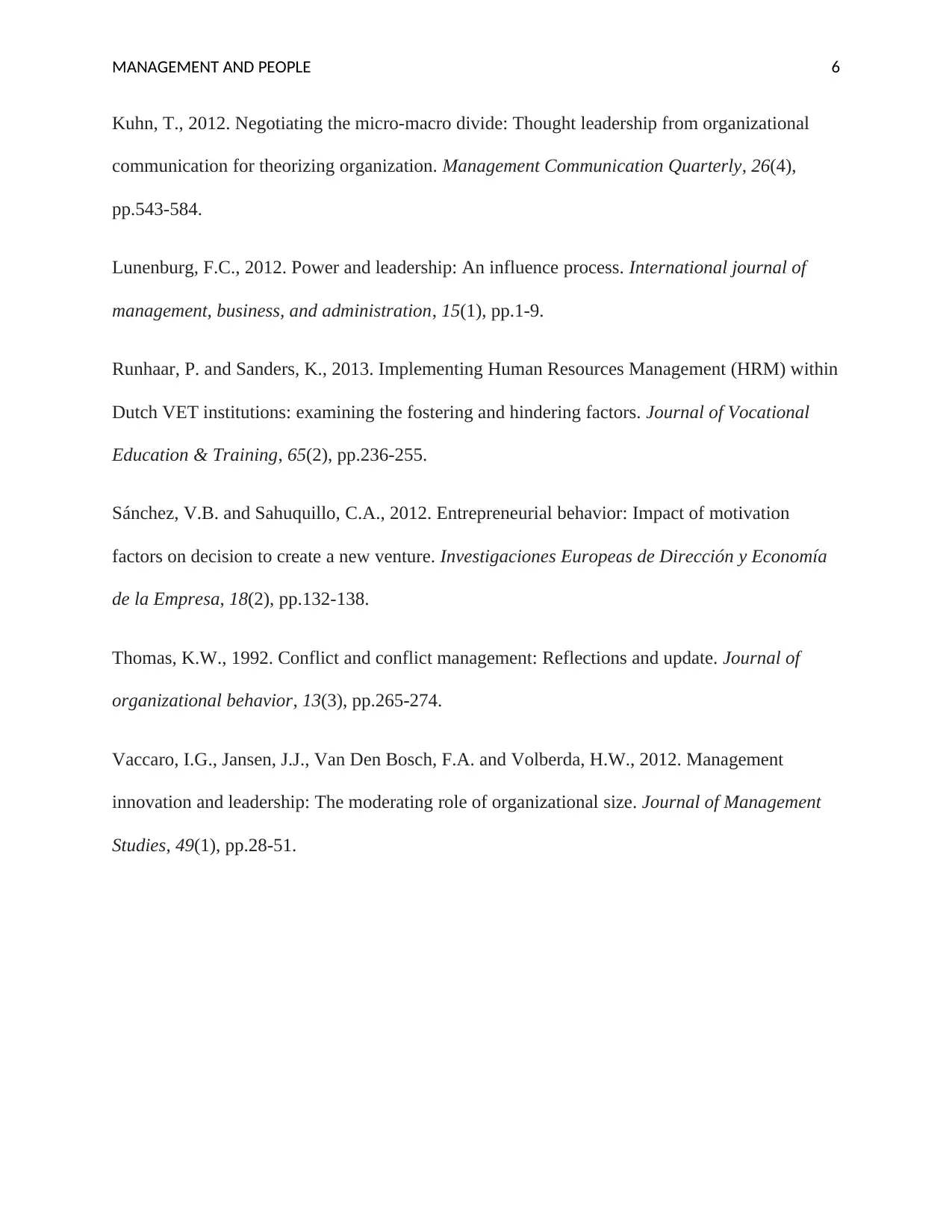
MANAGEMENT AND PEOPLE 6
Kuhn, T., 2012. Negotiating the micro-macro divide: Thought leadership from organizational
communication for theorizing organization. Management Communication Quarterly, 26(4),
pp.543-584.
Lunenburg, F.C., 2012. Power and leadership: An influence process. International journal of
management, business, and administration, 15(1), pp.1-9.
Runhaar, P. and Sanders, K., 2013. Implementing Human Resources Management (HRM) within
Dutch VET institutions: examining the fostering and hindering factors. Journal of Vocational
Education & Training, 65(2), pp.236-255.
Sánchez, V.B. and Sahuquillo, C.A., 2012. Entrepreneurial behavior: Impact of motivation
factors on decision to create a new venture. Investigaciones Europeas de Dirección y Economía
de la Empresa, 18(2), pp.132-138.
Thomas, K.W., 1992. Conflict and conflict management: Reflections and update. Journal of
organizational behavior, 13(3), pp.265-274.
Vaccaro, I.G., Jansen, J.J., Van Den Bosch, F.A. and Volberda, H.W., 2012. Management
innovation and leadership: The moderating role of organizational size. Journal of Management
Studies, 49(1), pp.28-51.
Kuhn, T., 2012. Negotiating the micro-macro divide: Thought leadership from organizational
communication for theorizing organization. Management Communication Quarterly, 26(4),
pp.543-584.
Lunenburg, F.C., 2012. Power and leadership: An influence process. International journal of
management, business, and administration, 15(1), pp.1-9.
Runhaar, P. and Sanders, K., 2013. Implementing Human Resources Management (HRM) within
Dutch VET institutions: examining the fostering and hindering factors. Journal of Vocational
Education & Training, 65(2), pp.236-255.
Sánchez, V.B. and Sahuquillo, C.A., 2012. Entrepreneurial behavior: Impact of motivation
factors on decision to create a new venture. Investigaciones Europeas de Dirección y Economía
de la Empresa, 18(2), pp.132-138.
Thomas, K.W., 1992. Conflict and conflict management: Reflections and update. Journal of
organizational behavior, 13(3), pp.265-274.
Vaccaro, I.G., Jansen, J.J., Van Den Bosch, F.A. and Volberda, H.W., 2012. Management
innovation and leadership: The moderating role of organizational size. Journal of Management
Studies, 49(1), pp.28-51.
⊘ This is a preview!⊘
Do you want full access?
Subscribe today to unlock all pages.

Trusted by 1+ million students worldwide
1 out of 6
Related Documents
Your All-in-One AI-Powered Toolkit for Academic Success.
+13062052269
info@desklib.com
Available 24*7 on WhatsApp / Email
![[object Object]](/_next/static/media/star-bottom.7253800d.svg)
Unlock your academic potential
Copyright © 2020–2026 A2Z Services. All Rights Reserved. Developed and managed by ZUCOL.





